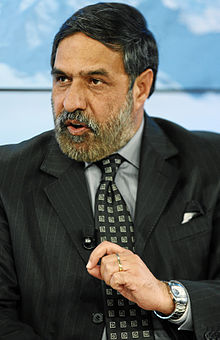Anand Sharma
| Anand Sharma | |
|---|---|

Anand Sharma at the 2012 World Economic Forum annual meeting in Davos
|
|
| Member of Parliament (Rajya Sabha) | |
|
Assumed office 3 April 2016 |
|
| Constituency | Himachal Pradesh |
|
In office 5 July 2010 – 9 March 2016 |
|
| Constituency | Rajasthan |
| Minister of Commerce and Industry | |
|
In office 22 May 2009 – 26 May 2014 |
|
| Prime Minister | Manmohan Singh |
| Preceded by | Kamal Nath |
| Succeeded by | Nirmala Sitharaman |
| Personal details | |
| Born |
5 January 1953 Shimla, East Punjab (now Himachal Pradesh) |
| Nationality | Indian |
| Political party | Indian National Congress |
| Spouse(s) | Zenobia Sharma |
| Alma mater | Himachal Pradesh University |
| Occupation | Lawyer |
| Religion | Hinduism |
Anand Sharma (Hindi: आनंद शर्मा; born 5 January 1953) is an Indian politician and former Union Cabinet Minister in charge of Commerce and Industry and Textiles in the Government of India. Since June 2014, Sharma is the Deputy Leader of opposition in Rajya Sabha, the upper house of the Indian Parliament.
Anand Sharma is the son of P. A. Sharma and Prabha Rani Sharma and was born in Shimla, Himachal Pradesh. He was educated at R.P.C.S.D.B. College, Shimla and Faculty of Law, Himachal Pradesh University, Shimla.
Sharma was a prominent leader in the student and youth movement in India, a founder member of the Congress Party's students wing the NSUI. He was also a former President of the Youth Congress. Sharma asserts that the country needed investment in the manufacturing sector and the cost of credit must be brought down for this purpose. In February 2012, Sharma led a business delegation of more than 120 people to Pakistan for improving trade ties. During this visit, he discussed the revision of the existing visa bilateral agreement, signed in 1974, with his Pakistani counterpart Makhdoom Muhammad Ameen Faheem, to facilitate travel by bona fide businessmen from both the countries.
As India's commerce and Industry Minister, he had taken major policy initiatives to accelerate Manufacturing and attract Foreign investments in India. Anand Sharma, was instrumental in making of India's first National Manufacturing policy (NMP) in 2011, with the objective to raise the share of manufacturing from 16 to 25 percent of GDP and creation of 100 million skilled jobs in a decade. To achieve that, the policy envisaged establishment of greenfield integrated manufacturing cities; NIMZ-National Investment and Manufacturing Zones. Sixteen NIMZ were notified.
...
Wikipedia
